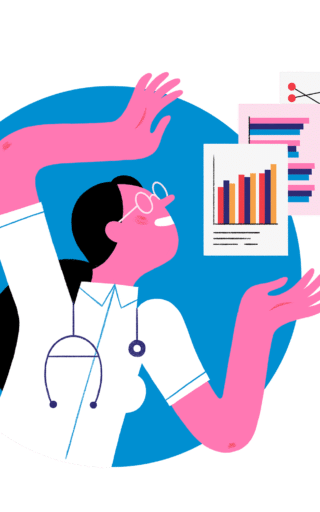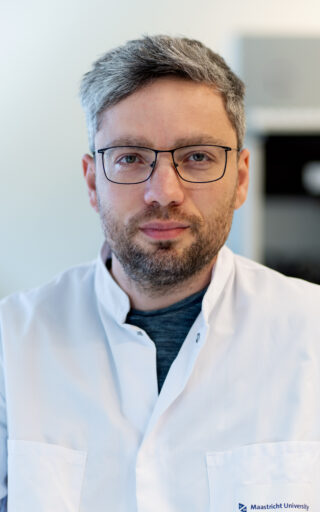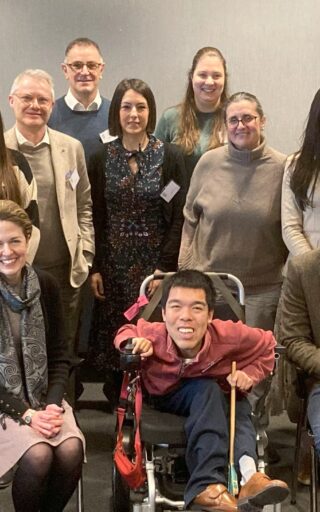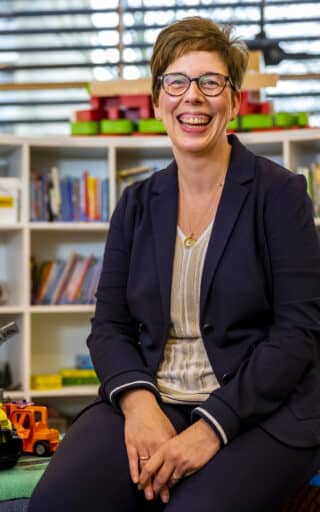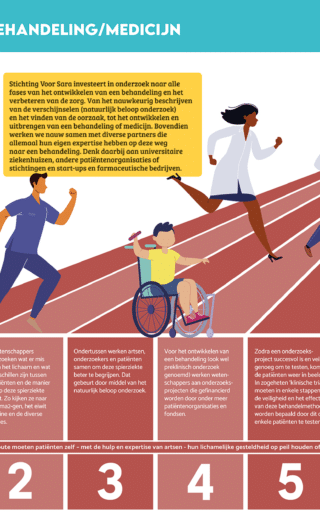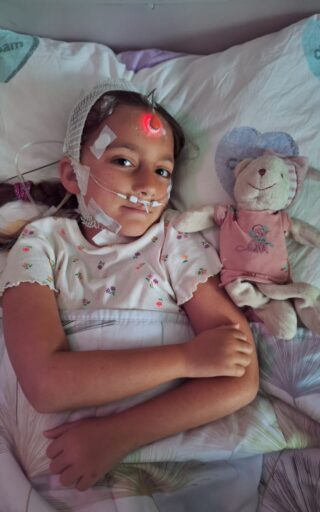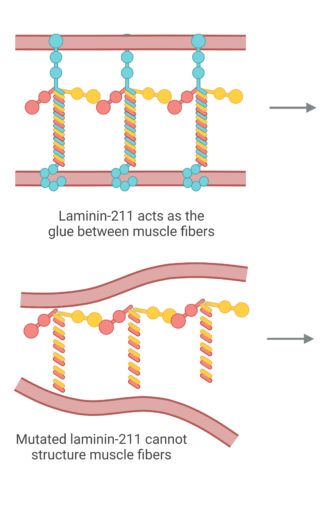
Samenwerken aan hoop: internationale stap richting een behandeling voor LAMA2-RD
Stichting Voor Sara investeert ruim €45.000 in een veelbelovend onderzoeksproject onder leiding van professor Markus Rüegg aan de Universiteit van Basel in Zwitserland. De stichting ziet dit als een strategische stap om de internationale samenwerking te versterken en de ontwikkeling van een behandeling voor LAMA2-gerelateerde spierdystrofie (LAMA2-RD) te versnellen. Deze investering vormt een cruciale bijdrage aan een groter traject dat erop gericht is deze therapie dichter bij klinische studies met patiënten te brengen. Door dit project te ondersteunen helpt de stichting grotere financiers en farmaceutische partners aan te trekken, wat de kans vergroot dat een behandeling daadwerkelijk patiënten zal bereiken.
English version below.
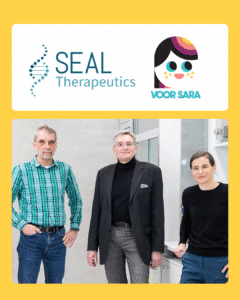 Het project
Het project
Het onderzoek richt zich op de ontwikkeling van een duale vector gentherapie die de gevolgen van het ontbrekende eiwit bij LAMA2-RD moet verlichten. De techniek maakt gebruik van onschadelijke virussen (AAV’s) om genetisch materiaal voor twee zogenoemde linkereiwitten in spiervezels af te leveren. In preklinische experimenten is aangetoond dat deze twee linkereiwitten het ontbrekende LAMA2-eiwit functioneel kunnen vervangen.
De bijdrage van Stichting Voor Sara wordt gebruikt om deze virussen te produceren onder omstandigheden die voldoen aan de kwaliteitsnormen die vereist zijn voor toekomstig gebruik bij mensen. Dit is een essentiële stap om aan te tonen dat de methode veilig en betrouwbaar kan worden opgeschaald — een voorwaarde voor de volgende fasen van het onderzoek en uiteindelijk voor klinische proeven.
Het bredere onderzoek en de technologie
Het team van professor Rüegg doet al meer dan 25 jaar baanbrekend onderzoek naar LAMA2-RD. Door innovatieve linkereiwitten te ontwikkelen, hebben zij in muismodellen laten zien dat zowel de spier- als zenuwfunctie grotendeels kan worden hersteld. Deze therapie is mutatie-onafhankelijk, wat betekent dat ze potentieel kan werken voor alle LAMA2-RD-patiënten, ongeacht hun specifieke genetische mutatie. De technologie wordt verder ontwikkeld door SEAL Therapeutics, een spin-off van de Universiteit van Basel, die samenwerkt met gespecialiseerde biotechbedrijven om de therapie richting klinische toepassing te brengen.
Hoop en verwachtingen
De resultaten tot nu toe zijn zeer bemoedigend: muizen die normaal ernstige ziekteverschijnselen vertonen, herstelden na behandeling vrijwel volledig. De onderzoekers hopen dat de volgende fase – ondersteund door Stichting Voor Sara – zal bevestigen dat deze aanpak veilig op grotere schaal kan worden toegepast. Als dit succesvol blijkt, zal het de weg vrijmaken voor de eerste klinische studie bij patiënten. Voor families die leven met LAMA2-RD betekent dit een krachtige nieuwe bron van hoop op een toekomst met meer kracht en minder beperkingen.
Trots en samenwerking
Als stichting zijn wij trots om dit internationale onderzoeksproject te ondersteunen. Deze uitbreiding past binnen onze bredere strategie om stap voor stap toe te werken naar een effectieve behandeling voor LAMA2-RD.
Naast de financiering van het onderzoek van professor Rüegg in Basel, steunen we ook het Nederlandse onderzoek aan de Universiteit Maastricht, onder leiding van professor Bert Smeets. Bovendien financiert Stichting Voor Sara natuurlijk beloop-onderzoek bij het RadboudUMC, droeg ze bij aan een biomarkerstudie voor LAMA2-RD, initieerde ze de ontwikkeling van zorgaanbevelingen en bevordert ze actief internationale samenwerking via online bijeenkomsten en wetenschappelijke conferenties.
Al deze initiatieven vullen elkaar aan en versterken elkaar, waardoor de kans op een doorbraak groter wordt – voor alle patiënten die leven met LAMA2-RD.
Funding by Stichting Voor Sara
The Dutch Foundation Voor Sara is investing over €45,000 in a promising research project led by Professor Markus Rüegg at the University of Basel in Switzerland. The foundation sees this as a strategic step to strengthen international collaboration and accelerate the development of a treatment for LAMA2-related muscular dystrophy (LAMA2-RD). This investment represents a crucial contribution to a larger trajectory that aims to bring this therapy closer to clinical studies in patients. By supporting this project, the foundation helps attract larger funders and pharmaceutical partners, increasing the likelihood that a treatment will reach patients.
The project
The project aims to develop a dual vector gene therapy designed to alleviate the consequences of the missing protein in LAMA2-RD. The technique uses harmless viruses (AAVs) to deliver genetic material for two so-called linker proteins into muscle fibers. The two linker proteins were shown in preclinical experiments to functionally replace the missing LAMA2 protein. The contribution from Stichting Voor Sara will be used to produce these viruses under conditions that meet the quality standards required for future human applications. This is an essential step to demonstrate that the method can be safely and reliably scaled up — a prerequisite for the next phases of research and, ultimately, clinical trials.
The broader research and technology
Professor Rüegg’s team has been conducting pioneering research into LAMA2-RD for more than 25 years. By developing innovative linker proteins, they have shown in mouse models that muscle and even nerve function can be largely restored. This therapy is mutation-independent, meaning it has the potential to work for all LAMA2-RD patients, regardless of their individual genetic mutation. The technology is being further developed by SEAL Therapeutics, a spin-off from the University of Basel, which collaborates with specialized biotech companies to move the therapy toward clinical application.
Hope and expectations
The results so far are highly encouraging: mice that normally show severe disease symptoms recovered almost completely after treatment. Researchers hope that the next phase – supported by Stichting Voor Sara – will confirm that this approach can be safely applied on a larger scale. If successful, it will pave the way for the first clinical study in patients. For families living with LAMA2-RD, this represents a powerful new source of hope for a future with greater strength and fewer limitations.
Pride and Collaboration
As a foundation, we are proud to support this international research effort. This expansion fits within our broader strategy to work step by step toward an effective treatment for LAMA2-RD. In addition to funding Professor Rüegg’s research in Basel, we also support the Dutch study at Maastricht University, led by Professor Bert Smeets. Furthermore, Stichting Voor Sara finances natural history research at the RadboudUMC, has contributed to a biomarker study for LAMA2-RD, initiated the development of care recommendations and actively promotes international collaboration through online meetings and scientific conferences.
All of these initiatives complement and reinforce one another, increasing the likelihood of a breakthrough — for all patients living with LAMA2-RD.
